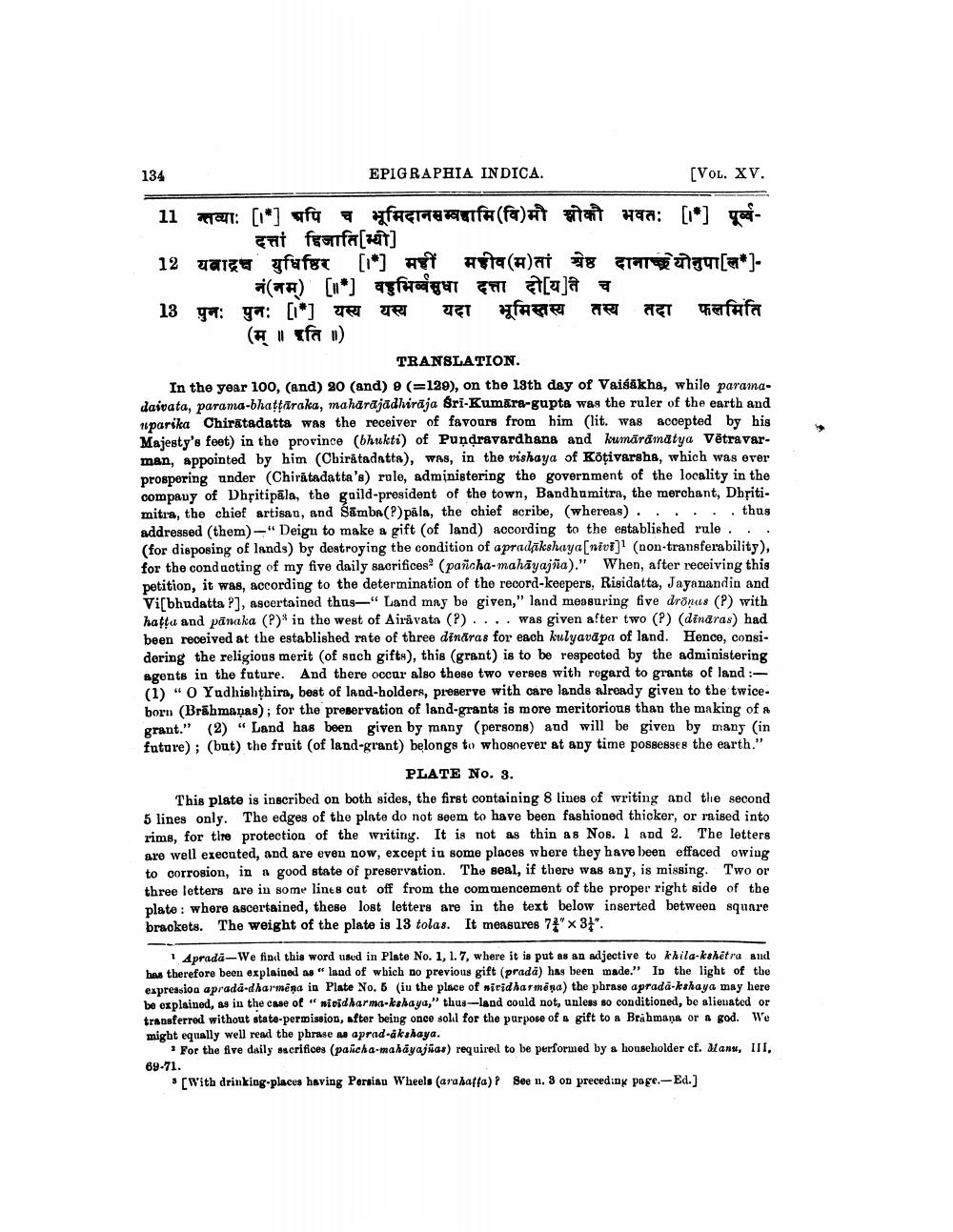________________
134
EPIGRAPHIA INDICA.
(Vol. xv.
11 eur: [1*] afu ACTAR (fa)t wait Hua: [1] yolla
at feufa [zit] 12 gag gfufet [1*] Het $79(A)at 8 119 [*]
(TA) (**) agfugu a[ua 13 ga: ga: [1] Te Te JEt fage de T iefafa (# fa 1)
TRANSLATION. In the year 100, (and) 20 (and) 9 (=129), on the 18th day of Vaisakha, while paramadaivata, parama-bhattaraka, maharajadhiraja Sri-Kumāra-gupta was the ruler of the earth and tsparika Chiratadatta was the receiver of favours from him (lit. was accepted by his Majesty's feet) in the province (bhukti) of Pundravardhans and loumārāmatya Vētravarman, appointed by him (Chiritadatta), was, in the vishaya of Kötivarsha, which was ever prospering under (Chirătadatta's) rule, administering the government of the locality in the compauy of Dhritipāla, the guild-president of the town, Bandhamitra, the merchant, Dhritimitra, the chief artisan, and Samba(?)pala, the chief scribe, (whereas) ...... thus addressed (them)-"Deigu to make a gift (of land) according to the established rule ... (for disposing of lands) by destroying the condition of a pradākshaya(nivi)! (non-transferability), for the conducting of my five daily sacrifices? (pañcha-mahāyajña)." When, after receiving this petition, it was, according to the determination of the record-keepers, Risidatta, Jayanandin and Visbhudatta ?], ascertained thus—" Land may be given," land measuring five drönus (P) with hatta and panaka (P)* in the west of Airāvata (?) . . . . was given after two (P) (dinaras) had been received at the established rate of three dināras for each kulyavápa of land. Hence, considering the religious merit (of such gifts), this (grant) is to be respected by the administering agents in the future. And there occur also these two verses with rogard to grants of land :(1) “ O Yudhishthira, best of land-holders, preserve with care lands already given to the twiceborn (Brāhmanas); for the preservation of land-grants is more meritorious than the making of grant.” (2) “Land has been given by many (persons) and will be given by many in future); (but) the fruit (of land-grant) belongs to whosoever at any time possesses the earth."
PLATE No. 3. This plate is inscribed on both sides, the first containing 8 lines of writing and the second 5 lines only. The edges of the plate do not seem to have been fashioned thicker, or raised into rims, for tire protection of the writing. It is not as thin as Nos. 1 and 2. The letters are well executed, and are even now, except in some places wbere they have been effaced owing to corrosion, in a good state of preservation. The seal, if there was any, is missing. Two or three letters are in some lines cut off from the commencement of the proper right side of the plate : where ascertained, these lost letters are in the text below inserted between square braokets. The weight of the plate is 13 tolas. It measures 74" x 34".
Aprada-We find this word used in Plate No. 1, 1.7, where it is put as an adjective to khila-kshetra and has therefore been explained as " land of which no previous gift (prada) has been made." In the light of the expression aprada-dharmena in Plate No. 5 (in the place of niridharmēna) the phrase aprada-kshaya may here be explained, as in the case of "wididharma-kshaya," thus-land could not, unless so conditioned, be alienated or transferred without state-permission, after being once solil for the purpose of a gift to a Brahmana or a god. We might equally well real the phrase a aprad-akshaya.
For the five daily sacrifices (parcha-mahayajñas) required to be performed by a householder cf. Manu, III, 69-71.
[With drinking places having Persian Wheels (arahatta)? See n. 8 on preceding page.-Ed.)




